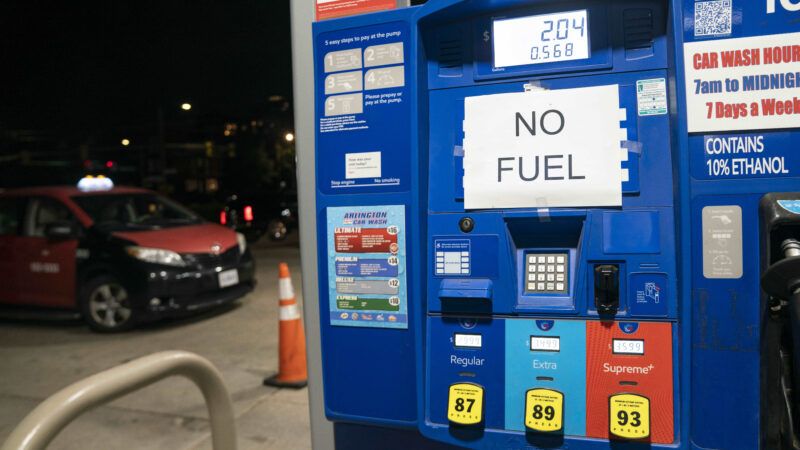Laws Against Price Gouging Won't Fix the Long Lines at the Gas Station
Don't punish businesses for raising prices during a crisis.

A cyber-attack on the company that operates one of the country's most important fuel pipelines has temporarily crippled the supply of gasoline and jet fuel to much of the East Coast, causing prices at the pump to rise by several cents in most of the affected states. More increases could be on the way as some gas stations have run out of fuel amid a craze of panic-buying.
Predictably, the crisis has already sent some federal and state authorities into a tizzy about so-called "price gouging" at the pump. During a press conference on Tuesday, Energy Secretary Jennifer Granholm issued a stern warning to gas station owners who might dare to raise their prices in response to changing market conditions.
Secretary of Energy Jennifer Granholm on shortages from the Colonial Pipeline cyberattack: "We will have no tolerance for price gouging" from gas station owners. https://t.co/ay3MJzTXcq pic.twitter.com/tF044nZml4
— USA TODAY (@USATODAY) May 11, 2021
"We expect that gas station owners are and should act responsibly," she said. But here's the thing: oftentimes raising prices during a crisis is the responsible thing to do.
When prices shoot up during a shortage, Duke University political scientist Michael Munger told Reason last year as politicians panicked over coronavirus-induced supply problems, one of the first things that happens is "consumers buy less."
"They look at that price and they say, 'You know, somebody else must need this more than I do,' and so they leave some for the person behind them," says Munger.
When you throw basic economics out the window, you end up with panicked consumers trying to buy up as much of the supply as they can. Which looks something like this:
https://twitter.com/AdamWeinstein/status/1392242750439952386?s=19
And this:
Man and woman brawl over line-cutting at packed North Carolina gas station https://t.co/SCnBwu2OPX
— The Daily Beast (@thedailybeast) May 12, 2021
Too often—and especially during times of crisis—politicians don't seem to understand that prices are a source of information for the public, rather than some arbitrary figure dreamed up by greedy businessmen. Disrupting the flow of that information doesn't help.
Criminalizing that flow of information is worse, but that's exactly what South Carolina has done. Alan Wilson, the state's attorney general, issued an emergency order Tuesday that anyone found selling gasoline for "an unconscionable price" could face fines of up to $1,000 or 30 days in jail.
Probably the best (so far) illustration of how basic economics completely befuddles politicians comes from North Carolina Gov. Roy Cooper (D), who dropped this golden nugget of advice yesterday.
I have talked today with federal officials including Energy Secretary Jennifer Granholm and we have a full court press to get the Colonial Pipeline back up and fully operating quickly. Report price gouging and please don't rush to top off your tanks. – RC
— Governor Roy Cooper (@NC_Governor) May 11, 2021
If only there was a way to discourage people from rushing to top off their tanks. Perhaps allowing companies to make it more expensive to do so would do the trick.


Show Comments (83)